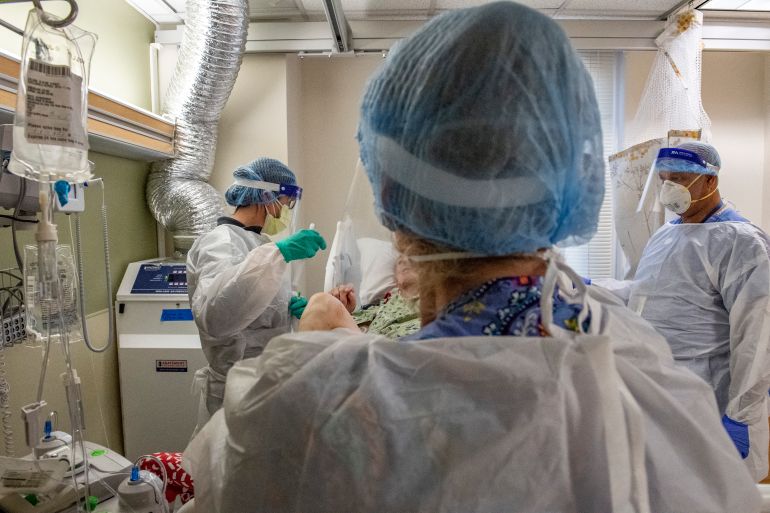WHO adds new drugs to COVID treatments amid Omicron surge
Latest recommendations prompt new calls for patent waivers to allow more people access to treatments.

The World Health Organization (WHO) has added two more drugs to its guidelines for recommended treatments for COVID-19, as the more infectious Omicron variant of the coronavirus triggers an unprecedented surge in cases around the world.
The drug baricitinib, which is also used to treat rheumatoid arthritis, is “strongly recommended” for patients with severe or critical COVID-19, in combination with corticosteroids, the UN agency’s panel of international experts said in the guidelines which were published by the British Medical Journal on Friday.
Keep reading
list of 4 items‘It checks all the boxes’: US approves Pfizer’s COVID-19 pill
UK approves COVID-19 drug that appears effective against Omicron
WHO to trial malaria, arthritis drugs as COVID treatments
The drug reduces the need for ventilation and had been found to improve patients’ chances of survival with no sign of an increase in adverse reactions, the panel said.
The panel also gave a “conditional recommendation” for sotrovimab, an experimental monoclonal antibody treatment, for those with non-severe COVID-19 but at the very highest risk of hospital admission. Monoclonal antibodies are lab-created compounds that mimic the body’s natural defence mechanism.
The new treatment recommendations come as the pandemic accelerates worldwide. More than 15 million new cases of COVID-19 were reported to the WHO in the last week – by far the most in a single week – driven by the Omicron variant, which is replacing the Delta variant almost everywhere.
The recommendations were based on new evidence from seven trials involving more than 4,000 patients with non-severe, severe, and critical cases of COVID-19.
The “guidance adds to previous recommendations for the use of interleukin-6 receptor blockers and systemic corticosteroids for patients with severe or critical covid-19; conditional recommendations for the use of casirivimab-imdevimab (another monoclonal antibody treatment) in selected patients; and against the use of convalescent plasma, ivermectin and hydroxychloroquine in patients with covid-19 regardless of disease severity,” the WHO said in a statement.
The French humanitarian organisation Médecins Sans Frontières (MSF) welcomed the new recommendations and urged governments to address patent protections to ensure that as many people as possible would be able to benefit from the treatments.
Baricitinib is produced by United States pharmaceutical giant Eli Lilly, and while generic versions are available in India and Bangladesh, patents are in force in many other countries including Brazil and Indonesia.
“For nearly two years, we have helplessly witnessed people dying of COVID-19 amid catastrophic waves of disease. In countries where MSF works,” Dr Márcio da Fonseca, infectious diseases medical adviser for the MSF Access Campaign, said in a statement.
“The possibilities for providing high-level intensive care are limited, so saving more lives of people with severe and critical infections relies heavily on having access to affordable medicines that we can add to the steroids, oxygen and close supportive care that we already provide in our projects. As new treatments emerge, it will be simply inhumane if they remain unavailable in resource-limited settings, just because they are patented and too expensive.”
The WHO added what it said were “lifesaving” interleukin-6 receptor blockers to its list of treatments for COVID-19 last July. It recommended the use of corticosteroids in September 2020.
In recent weeks, government regulators have also approved new oral treatments for the disease, including Paxlovid, Pfizer’s antiviral pill, which showed close to 90 percent efficacy in preventing hospital admission and death in high-risk patients. It also retained its effectiveness with Omicron, the company said.